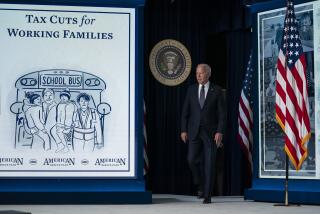Senate Offers Aids to Cost of Education
- Share via
WASHINGTON — The Senate passed legislation Thursday that would press two popular election-year buttons at once: expanding the amount of money parents could save tax-free and allowing them to spend it on their children’s education.
A splinter group of Democrats joined the Republican majority in support of the measure, dubbed the “Affordable Education Act.”
The bill would boost to $2,000 the amount that parents could contribute to a tax-sheltered education savings account each year, up from $500 under a program created by a 1997 law. And for the first time, it would allow the money to be spent on elementary or secondary education, including home schooling. Eligible expenses would include tuition, academic tutoring, books and supplies and even computers used for school. The current program only allows savings to be spent on post-secondary education expenses.
The savings accounts would cost taxpayers at least $2.4 billion over 10 years, according to tentative projections.
While prospects for passage in the Republican-controlled House are favorable, the bill is not likely to become law. Thursday’s vote was 61 to 37, short of the two-thirds majority that would be needed to override an expected presidential veto. Sen. Dianne Feinstein (D-Calif.), who is up for reelection this year, voted for the bill while the state’s other senator, Democrat Barbara Boxer, opposed it.
President Clinton’s advisors have said that he opposes the legislation in large part because parents would be allowed to spend the additional savings on private-school tuition, a provision that has drawn widespread criticism from many public education groups.
Still, versions of the bill have won congressional approval in each of the last two years. Thursday’s vote reflected growing public sentiment that parents who are disenchanted with subpar public school systems should be given as many options as possible to help their children.
Members of “a family take their own money, earned off the sweat of their own brows, put it in a private account and use that money--which has not been taxed because of this legislation--and pay tuition,” said Sen. Robert G. Torricelli (D-N.J.), one of the bill’s sponsors. “That cannot be a bad thing.”
Polls have shown in recent years that education is a top concern of voters. In response, Congress and Clinton have launched a number of initiatives--including one to hire 100,000 new elementary teachers to reduce class size--increasing the education budget at a rate exceeding that of many other federal programs.
But most of Torricelli’s fellow Democrats complained that the bill approved Thursday was tilted in favor of well-to-do taxpayers who would be able to take full advantage of tax-sheltered savings accounts. The legislation, they argued, would do little to solve the most pressing problems in American education and give little comfort to the poorest parents.
One after another, Democrats argued for other measures. Put more federal money into education for disabled students, they said, or teacher training programs, or standardized report cards to hold public schools accountable.
“We’re talking today about how to spend money to improve this country’s education system,” said Sen. Byron L. Dorgan (D-N.D.), an opponent of the bill. “But there’s another way to handle this, and that is to make investments in our schools.”
That view was echoed by the National School Boards Assn., which is known as one of the more centrist public education groups. “Education savings accounts would disproportionately be used by affluent families and provide very little benefits to lower- and middle-income families,” the association wrote in a letter to senators.
The arguments over the bill echoed the school voucher debate. Vouchers, which have been tried in some cities around the country, offer direct government aid to parents who choose to enroll their children in private schools. Long a pet cause of conservatives, school vouchers in recent years have won a few converts among liberal education commentators and politicians, who acknowledge that something radical must be done to help parents with kids stuck in failing urban school districts.
But for many people who describe themselves as public school advocates, and especially Democrats, vouchers remain anathema.
More to Read
Get the L.A. Times Politics newsletter
Deeply reported insights into legislation, politics and policy from Sacramento, Washington and beyond. In your inbox twice per week.
You may occasionally receive promotional content from the Los Angeles Times.










